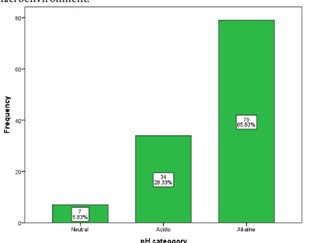
Frequency of Streptococcus mutants in patients having dental caries; a data from clinical setting in rural area of Balochistan
Abstract
To assess the frequency of streptococcus mutans (S. mutans) and its association with socio-demographic factors in patients having dental caries presenting at a DHQ hospital in rural area of Balochistan. It was a cross-sectional study conducted at the clinical setting or DHQ hospital of a rural area in Balochistan from April 2020 January 2021. About 120 patients of age 18 to 40 years of either gender presenting dental caries were included in the study using non-random consecutive sampling technique. Data regarding age, gender, ethnicity, addictions (like gutka and smoking) pH level and oral hygiene was obtained from all the participants by researcher himself. The number of S. mutans colonies (CFU) was counted using a self-illuminating binocular microscope after plates were incubated for 48 hours at 37°C. All findings were entered into a pre-designed proforma. SPSS version 23 was used to analyze data. The median age of patients with dental caries was 28 years (IQR: 21-35 years) and 83.3% of the patients were males. The median S. mutans count of all the patients with dental caries was estimated as 35 with IQR as 32 to 38. Mann-Whitney statistics showed significant difference between ethnic groups for S. mutans count (p=0.049). A weak correlation was observed between S. Mutans count and pH level (r=0.206) with statistically insignificant difference (p=0.206). Frequency of S. mutans is 100% in individuals with dental caries. S. mutan counts have a significant association with ethnicity and weak correlation with pH in saliva.
Keywords
Dental caries, dental cavity, dental health, saliva, salivary pH, Streptococcus mutans
Full Text:
PDFDOI: https://doi.org/10.33865/wjb.006.03.0453
Refbacks
- There are currently no refbacks.
Copyright (c) 2021 Eid Muhammad, Saima Akram Butt, Shehla Shaheen, Tamoor khan

This work is licensed under a Creative Commons Attribution 4.0 International License.
Print ISSN: 2522-6746 : Online ISSN: 2522-67541. How to register 2. How to reset password2. How to prepare a manuscript before submission 3. How to submit a paper 4. How to check the review status of a paper5. How to check the plagirisim or similarity report